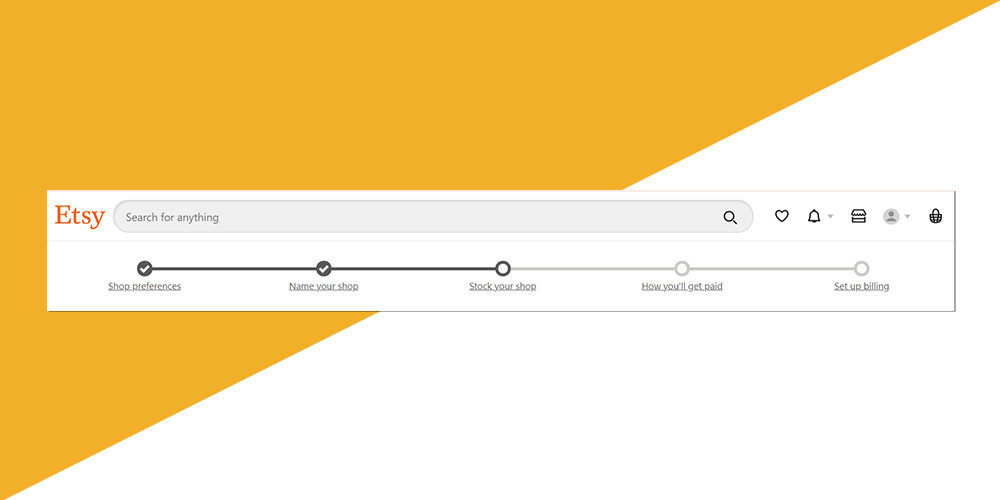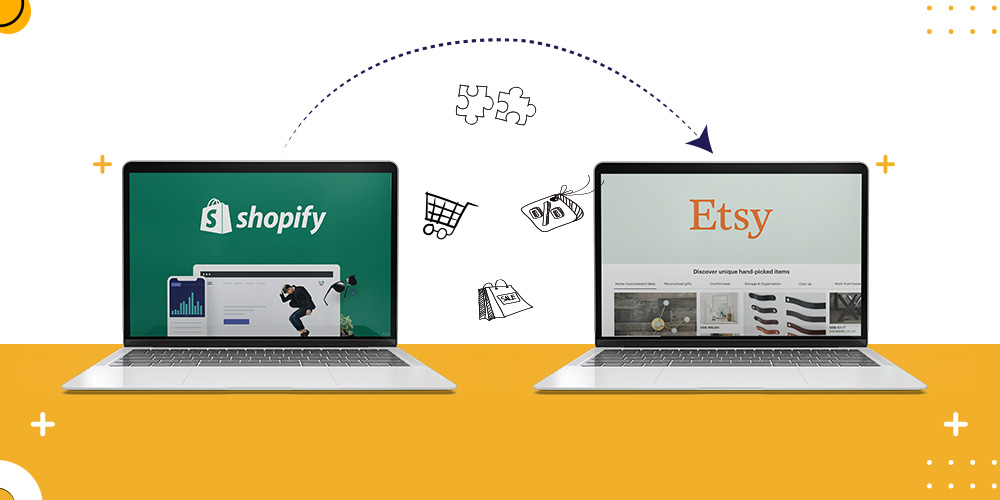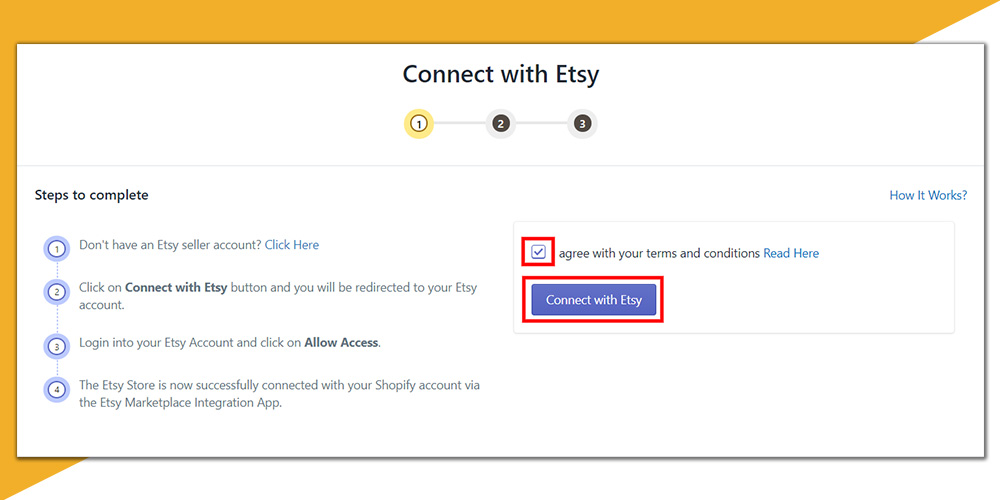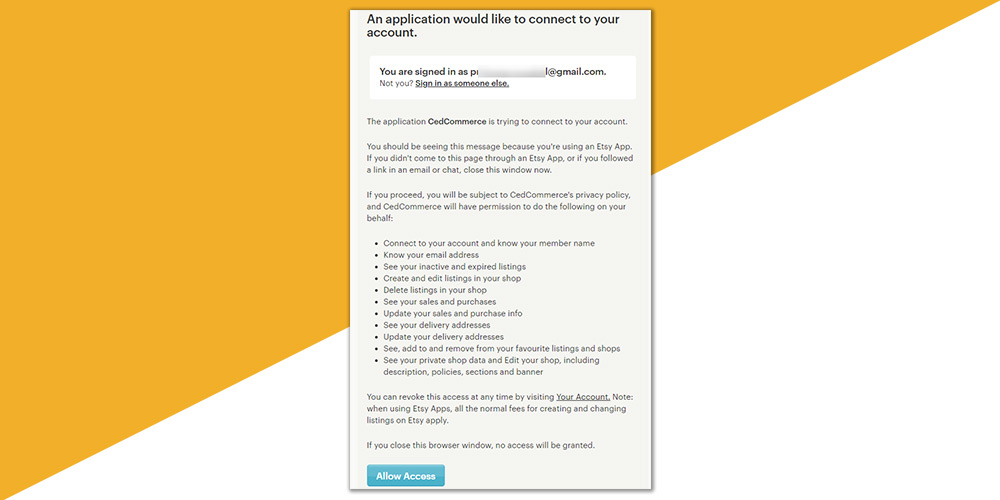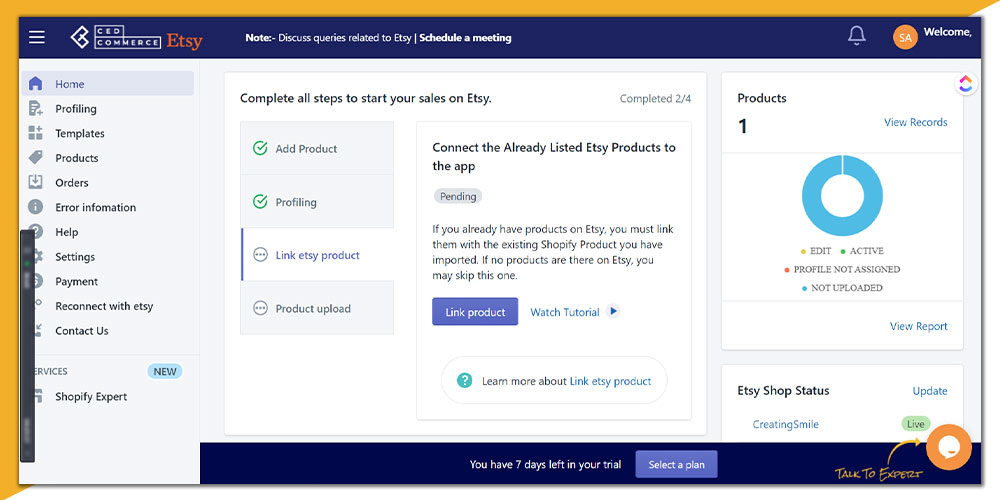

The most efficient way to sell Shopify products on Etsy!

Running short of time? Get PDF of the blog in your mail.
|
Play Now

|
When it comes to selling creative products, Etsy is the go-to marketplace for eCommerce enthusiasts. It’s also the first choice for buyers seeking unique, handmade, and vintage items. If you’re looking to expand your reach and sell your creative products to millions of buyers from your Shopify store on Etsy, this comprehensive guide is your go-to guide.
Etsy’s remarkable growth is evident in the eCommerce landscape. Specializing in handmade, crafty, vintage, and print-on-demand products, Etsy’s global GMV has surged by 151%, solidifying its position as a leading marketplace for creative goods (source – Marketplacepulse). And, with over 95.8 million active buyers, Etsy offers Shopify sellers an incredible opportunity to scale their creative businesses.
Why should you list Shopify items on Etsy?
Instant exposure
Building substantial traffic from a single channel (i.e., your Shopify store) can be extremely time-consuming and a slow process. However, with Etsy’s massive customer base and built-in traffic, you can build your traffic consistently and increase sales. Etsy gets around 500 million visitors to its site every month; so you can imagine the potential selling on Etsy can bring to your business.
In addition to the audience that visits Etsy, your products will also be featured all over the internet through large-scale advertising. Some platforms where Etsy actively advertises without imposing any upfront costs on the sellers are Google, Facebook, Instagram, Pinterest, and Bing. Etsy’s seller application also features unique shop updates where you can reach sellers, make your photos shoppable, and end up in the buyer’s scrolling feed on Etsy.
Easy Setup
Another reason why you should list your products on Etsy is that it is an effortless process. Just a few clicks and your shop is ready to go live. However, the struggle is the massive amount of work required to create new listings on Etsy from scratch. But, what if there’s an alternative way to list your products in a matter of minutes and start selling on Etsy in just a few clicks? Yes, there is, we’ll get to it in a bit.
Moving back, starting an Etsy shop is a simple five-step process that takes not more than a few minutes. Follow this simple guide to start your journey on Etsy.
Community support
Etsy has given creators, vintage collectors, and artists from across the world a platform to engage with each other. The Etsy Community is an interactive place where you can learn new trends, discuss your creative process, and let others know your business’s motto. Through the Etsy Community, you have access to inspiration, advice, and new opportunities directly from a community of sellers like you.
Signing in to the Etsy community is easy. All Etsy members can view Forums and Teams, but you must have an open Etsy shop to post in the Forums or join and create teams.
Also read: Top selling items on Etsy in 2024 that can help you increase sales.
Buyers trust Etsy
When starting a new online business, any entrepreneur’s primary concern is to build trust in the shoppers. Before purchasing an item online, buyers generally trust any online business based on their shopping experience. This may include how easy and safe was the payment process, how quickly and easily they found what they were searching for, and what other shoppers have to say about that brand or store.
The Etsy marketplace’s reputation is well-known and established in the eCommerce industry due to its authenticity and creative horizons. You can be well assured that all your data is also well protected on this eCommerce giant.
Easy management
From opening your shop on Etsy to making your first sale and beyond, Etsy is super easy to use and is beginner-friendly. This means you do not need to have a technical background to become a pro seller.
Apart from this, if you have an existing Shopify store, you have the edge over others. You can enjoy the option to manage Etsy listings and orders from your current store’s dashboard. Sounds exciting, right? Considering the time and effort that you will be saving this way, it sure is exciting.
Now that you are clear as to why you should be selling on Etsy let’s dive straight into the easiest and the most effective way to do it.
How to list Shopify products on Etsy?
Before learning about the ways to create product listings, let’s first understand what listings are:
In e-commerce, the term listing is used to describe a product page. Each product listing includes the details of your products that are shown on a specific product page. These details may include the title, description, photos, videos, and price of the product. Your processing time, shipping details, and other crucial information are often seen as a part of your product listing and are visible to the buyers on the product pages.
Shopify sellers looking to increase their sales by selling Shopify products on Etsy can do so by:
- Manually Listing Shopify Products on Etsy
- Using an Integration to List Shopify Products on Etsy
Manually Listing Shopify Products on Etsy
Step 1: Sign up on Etsy
Step 2: Choose Shop Preferences
Step 3: Stock up your shop. You will have to create new listings all over again on Etsy
Step 4: Choose how you want to get paid
Step 5: Set up billing
And that’s it! You can start selling on Etsy now. Once your shop is live, you will be able to manage it through the Dashboard by going into your Shop Manager on Etsy.
However, using this manual way to list your Shopify products on Etsy can be a time-consuming and humongous task. It can take up to days for even a small-scale business with a good number of products. You will have two separate dashboards for both the selling channels, making store management an exhausting job.
Optimizing each product listing for Etsy search will be a tough job. Without proper details, your product will not be easily fetchable on Etsy.
The increased amount of work will eat up your time for creativity and the creation process. And, in turn, can result in low discoverability for Etsy shoppers and ultimately, poor business growth.
Using an Integration to List Shopify Products on Etsy
The previous one is time-consuming and practically impossible to do in a limited time. But, there is a more efficient way to discover how to list Shopify products on Etsy.
You can list items on Etsy directly from your Shopify store. Not just that, you will also be able to manage both the stores from a single dashboard by integrating Etsy and Shopify.
How will stores integrate?
The CedCommerce – Etsy Integration plays a key role in your expansion process. It works as a connecting channel that allows information from both stores to be in sync. When the details of your listings, inventory, orders, etc synchronized, you will be able to manage your business with much more efficiency and your productivity will increase manifolds.
The app allows Shopify sellers to list thousands of products at once. To achieve the same, you will be required to install the CedCommerce – Etsy Integration from the Shopify App store and integrate your Etsy shop with the Shopify store through the app with just a couple of clicks. Once the integration process is complete, you will send products to Etsy from your Shopify store.
After installing the CedCommerce – Etsy Integration App from the Shopify App store, you will be good to go in three simple steps.
Step 1: Connect with Etsy
Here, you will connect your store with your Etsy shop. Once you click on the ‘Connect with Etsy’ button, you will be redirected to your Etsy shop to grant access to the App.
When you click on the ‘Allow Access’ button, you will proceed to the next step.
Step 2: Product Import:
Now select the products you want to sell on Etsy. You are allowed to select all the products, just the published products, or filter the products based on your preferences.
Once the products are imported into the app, you will be moved to the last step!
Step 3: Profiling:
At this step, assign the Etsy category in which your products fall. In case your products belong to different categories, then skip this step and continue.
If a single category is suitable for all your products, then proceed by assigning other details about your product under Attribute mapping. Set up Shipping Templates for this profile and click on ‘Next’ to proceed further.
Profiles help you to group your products together based on a set of rules or conditions assigned to them. The conditions or rules attributed to a profile are assigned to all the products of that profile. Products are uploaded on Etsy with these assigned conditions or rules.”
Once the configuration steps are completed, you will be redirected to the app’s dashboard.
Through the app’s feature-packed dashboard, you will be able to add new products or edit the existing ones in the app. You can also create new profiles, edit templates and fulfill Etsy orders from your existing Shopify store.
The CedCommerce-Etsy Integration won the TikTok Shop’s Best Connector App
How to publish products on Etsy from Shopify?
After successfully importing your Shopify products into the integration app, you’re now ready to list them on Etsy. The best part? You can bulk-upload products directly from the app, saving a significant amount of time.
Here’s how it’s done:
- Navigate to the Product Section: On the app dashboard, go to the Product section.
- Select Products: Choose either all the products or specific ones you want to list on Etsy.
- Publish on Etsy: Under the bulk action section, select ‘Publish on Etsy’. This allows you to list hundreds or even thousands of items on Etsy directly from your Shopify store.
Linking Etsy products with Shopify
In case, you have already listed some products on Etsy, you can select the ‘sync with Etsy’ option in the app. By doing this, any products that are listed on Etsy and Shopify will be linked and duplicate listings will not be created.
Linking your Etsy products is essential as it avoids duplication.
Difference between listing and linking products
Remember, listing and linking are not the same. Product listing through the app refers to uploading your Shopify products on Etsy via the application. On the other hand, linking products will allow you to sync your existing Etsy listings(if any) with the app, eliminating any chances of creating duplicate product listings. With this feature, you will not have to delete any existing product listings from your Etsy shop, rather link those products with the app, and you are good to go!
Benefits of Linking Products
- Sync products on Etsy and Shopify for easy management
- Check inventory and fulfill orders received on Etsy from your very own Shopify store
- Avoid duplication of product listings on Etsy
Why Sell Shopify Products on Etsy? (Final Words)
You might have incredible and creative products. But, do you know how to pack orders, create listings that reach millions, manage fulfillment, do marketing, and manage customer queries? Etsy is a highly lucrative marketplace with millions of in-built customers. If you strategize smartly on the Etsy marketplace and market your product properly, the scope of business growth is high. Because, while managing your listings across Shopify and Etsy, you not only do you own your brand but also your brand!
To aid you in your journey, the CedCommerce – Etsy Integration is a great solution that provides seamless and easy integration of stores. Through the app, you will not only be able to list hundreds of products on Etsy at once but will also enjoy effortless management of products, inventory, and orders through a single dashboard. Growing bigger has never been easier!
Do you still have some questions? Check out these FAQs below.
FAQs
Why should I sell on Etsy? I am happy selling on my Shopify store.
While you might be satisfied with selling your creative products on Shopify. You are currently missing out on reaching out to millions of customers on the Etsy marketplace. Selling on one eCommerce platform will only result in limited growth and sales. However, selling on a marketplace like Etsy can help you access millions of pre-established Etsy shoppers.
Why should I choose the CedCommerce-Etsy Integration?
While there are numerous integration solutions available in the market, you should consider choosing CedCommerce-Etsy Integration as CedCommerce is an official Etsy & Shopify partner. Along with that, thousands of merchants currently love and trust the Etsy Integration. More than 1.6K merchants have given 5-star ratings on the Shopify App Store. Shopify itself recommends using the CedCommerce-Etsy Integration in its guide – selling on Shopify & Etsy.
How much do I need to pay for the CedCommerce-Etsy Integration?
The CedCommerce-Etsy Integration is free to install on the Shopify app store. Each subscription plan is based on the number of orders you will receive on Etsy. The plans start from $19/mo to $59/mo. Yearly and enterprise plan options are also available. Visit this page to learn more.
Where should I start selling my creative products – Etsy or Shopify?
Whether you should start on Etsy or Shopify depends on your business needs and goals:
Start on Etsy if:
- You sell handmade, vintage, or craft supplies
- You prefer a marketplace with an existing customer base and built-in traffic
- You want a low-cost entry point with minimal setup requirements
Start on Shopify if:
- You want full control over your brand and website design
- You plan to scale your business and need advanced eCommerce features
- You want to integrate with various sales channels and marketing tools
- Many successful sellers start on Etsy to take advantage of its marketplace environment and then expand to Shopify as their business grows and they seek more customization and control over their online store
